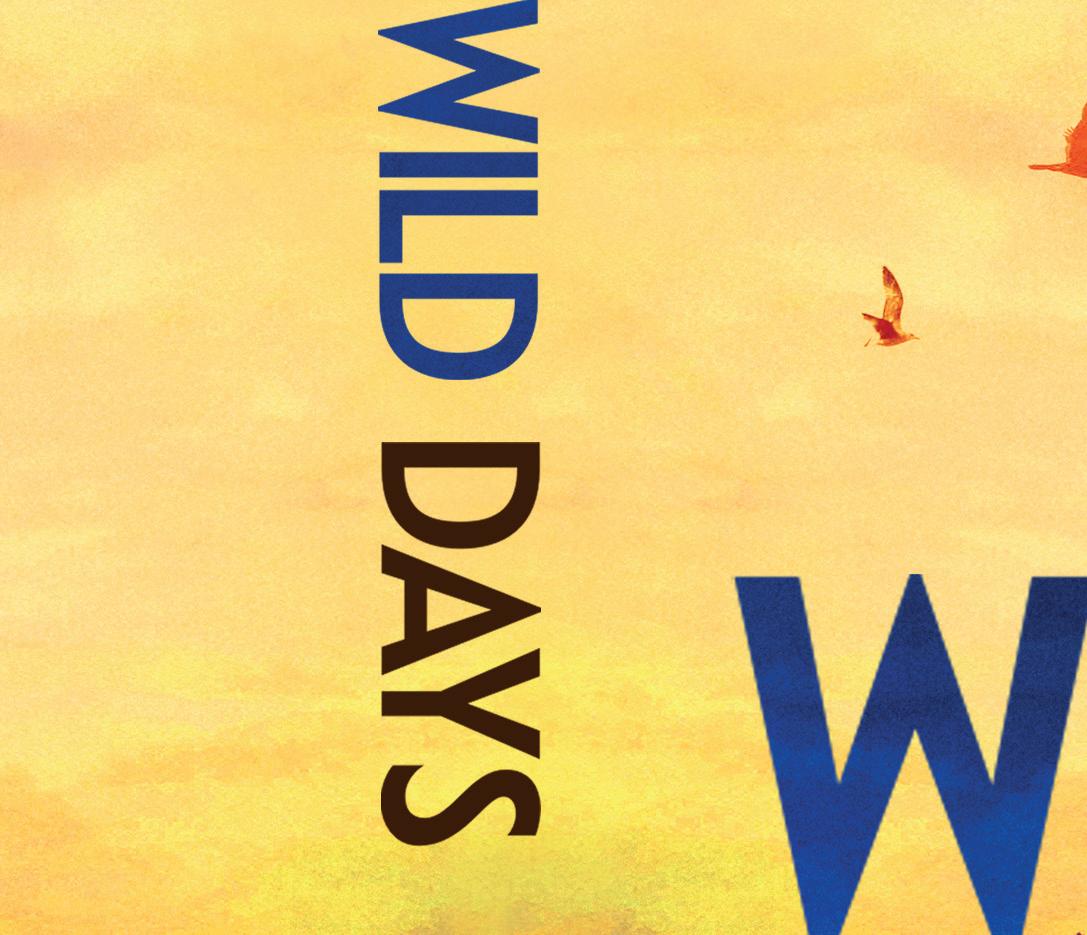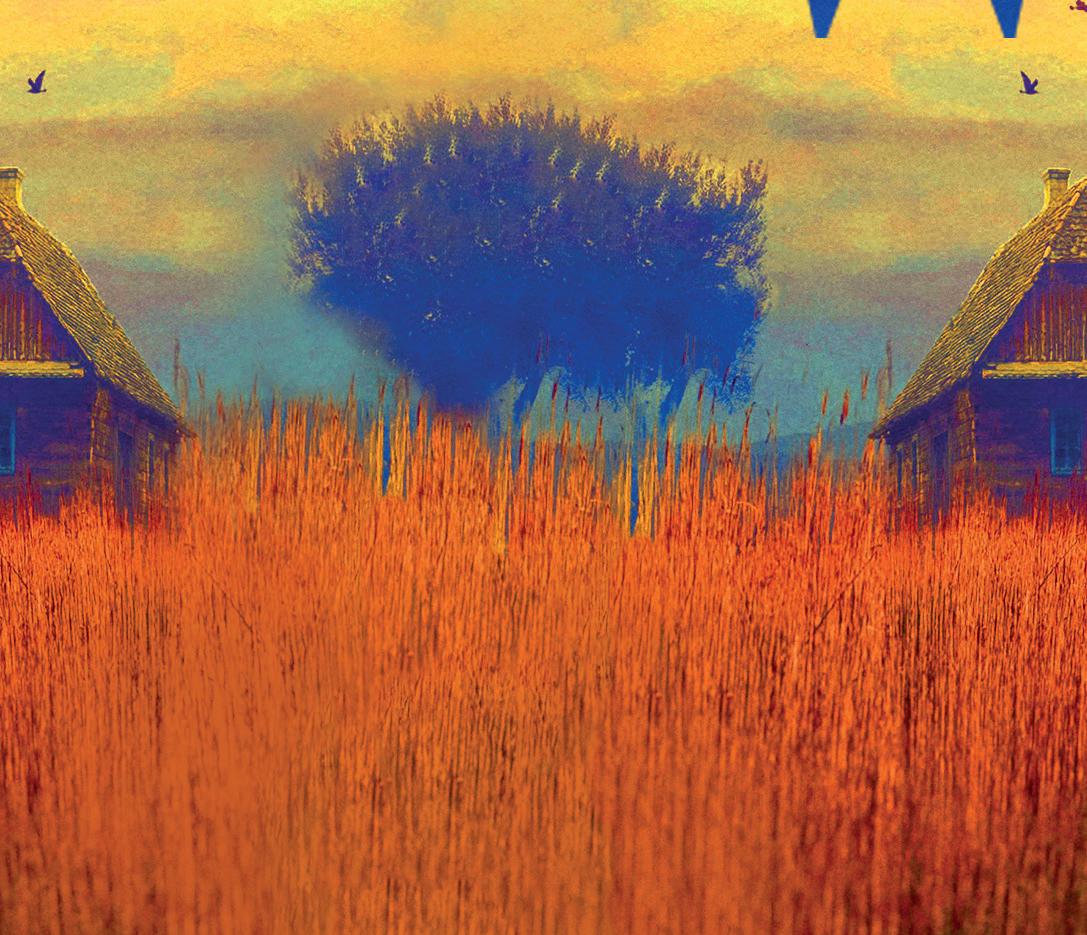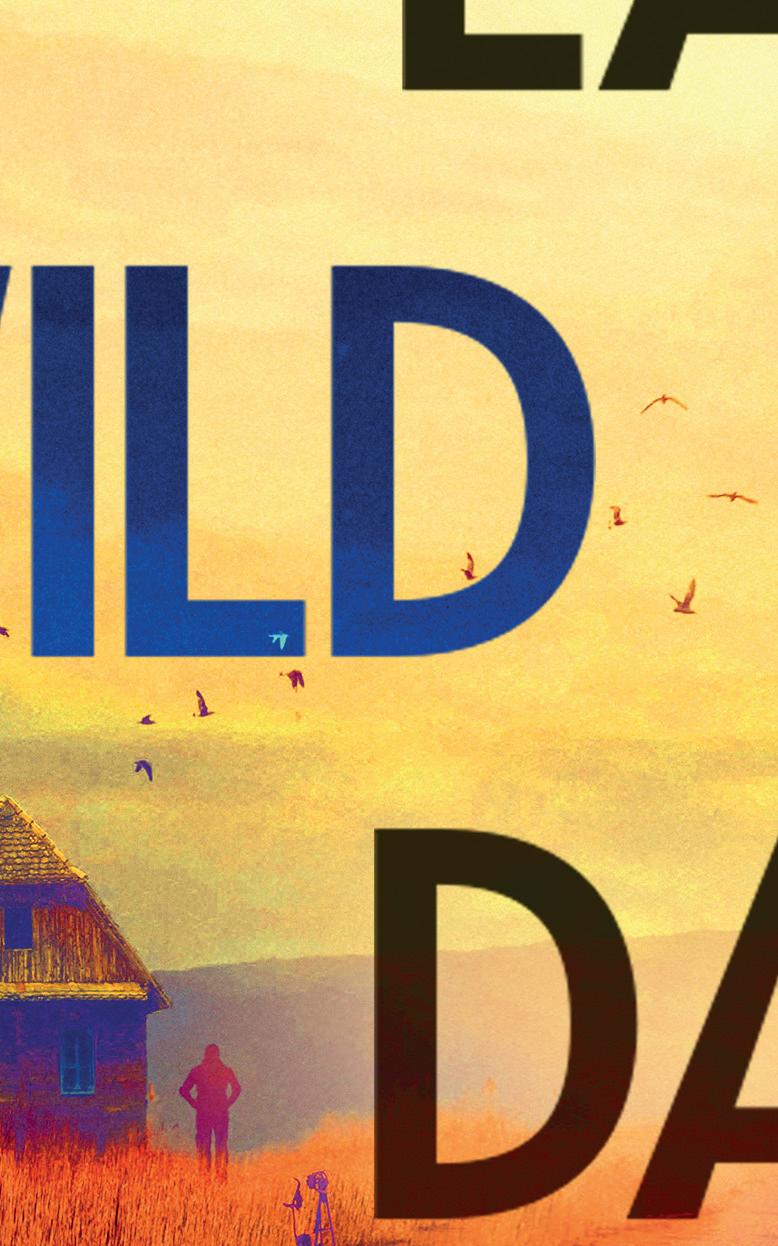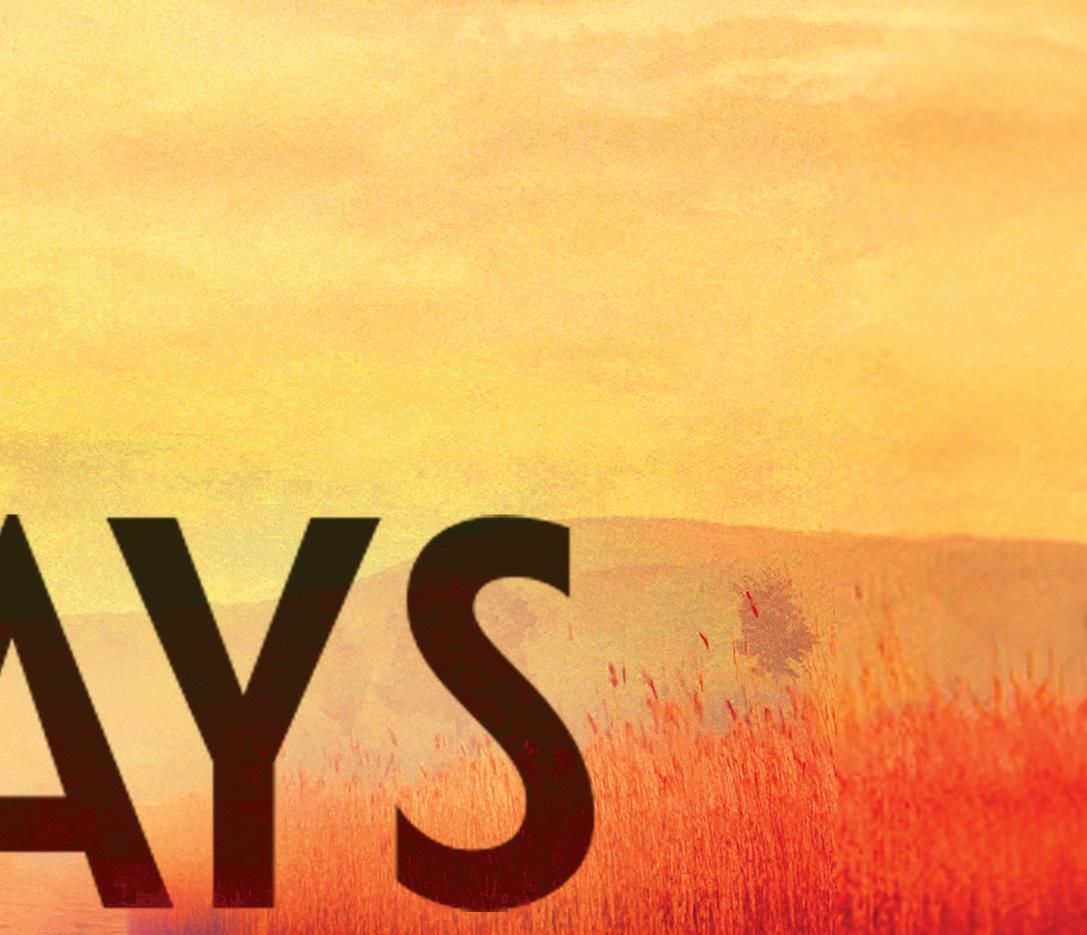FROM THE SUNDAY TIMES BESTSELLING AUTHOR OF TALL BONES






FROM THE SUNDAY TIMES BESTSELLING AUTHOR OF TALL BONES








‘A PROPULSIVE, BOLD AND BRUTAL SLICE OF SOUTHERN GOTHIC BRILLIANCE’ CHRIS WHITAKER


Doubleday logo - spine use
11.684 mm x 12 mm
TRANSWORLD PUBLISHERS
Penguin Random House, One Embassy Gardens, 8 Viaduct Gardens, London SW11 7BW www.penguin.co.uk
Transworld is part of the Penguin Random House group of companies whose addresses can be found at global.penguinrandomhouse.com

First published in Great Britain in 2025 by Doubleday an imprint of Transworld Publishers
Copyright © Anna Bailey 2025
Anna Bailey has asserted their right under the Copyright, Designs and Patents Act 1988 to be identified as the author of this work.
This book is a work of fiction and, except in the case of historical fact, any resemblance to actual persons, living or dead, is purely coincidental.
Every effort has been made to obtain the necessary permissions with reference to copyright material, both illustrative and quoted. We apologize for any omissions in this respect and will be pleased to make the appropriate acknowledgements in any future edition.
A CIP catalogue record for this book is available from the British Library.
ISBNs
9780857527400 (hb)
9780857527417 (tpb)
Typeset in 11.25/15.75 pt Giovanni by Falcon Oast Graphic Art Ltd Printed and bound in Great Britain by Clays Ltd, Elcograf S.p.A.
The authorized representative in the EEA is Penguin Random House Ireland, Morrison Chambers, 32 Nassau Street, Dublin D02 YH68.
Penguin Random House values and supports copyright. Copyright fuels creativity, encourages diverse voices, promotes freedom of expression and supports a vibrant culture. Thank you for purchasing an authorized edition of this book and for respecting intellectual property laws by not reproducing, scanning or distributing any part of it by any means without permission. You are supporting authors and enabling Penguin Random House to continue to publish books for everyone. No part of this book may be used or reproduced in any manner for the purpose of training artificial intelligence technologies or systems. In accordance with Article 4(3) of the DSM Directive 2019/790, Penguin Random House expressly reserves this work from the text and data mining exception
Penguin Random House is committed to a sustainable future for our business, our readers and our planet. This book is made from Forest Stewardship Council® certified paper.
For my wife, Aude
A girl bursts out of the woods. She staggers on to the road, trying to regain her balance, kicking up yellow dust with the dirty heels of her sneakers, but she doesn’t wait, not even to push the sweaty hair from her face. She is tall for her age, which makes her look older than she is – barely thirteen – and at this very moment her body seems like something totally beyond her control, barrelling down the road, her knees throbbing with every step. But she does not stop. She doesn’t dare.
The evening air has a thickness to it, as though someone has left an oven open nearby. Either side of the road, Spanish moss stirs in the boughs of the knock-kneed cypresses and shadows are gathering between an old duck-hunter’s cabin and the timbers of an upturned fishing boat, which slouches in the weeds like the bones of some long-dead animal. Overhead, the moon claws its way out from the tangle of branches, and the girl looks over her shoulder, panting so hard that colours come out of nowhere at the corners of her eyes. There’s grit in her mouth, making her throat itch so bad it tastes like it’s bleeding.
But the road behind her is empty. Still, she keeps on running. There is nothing coming out of the woods.
Assumption Parish is largely backcountry, cross-hatched with ragged forest and waterways and split down the centre by Lake Verret, which drains into that great artery the Atchafalaya River and eventually out into the Gulf of Mexico. Most of Assumption’s population centres lie east of the lake, a scattering of small towns bordered by farmland, but on the western shore a few settlements hang on between the trees and the swamp. In Jacknife, a billboard advertises the sale of metal detectors, ammo and snow kones with a K. Outside the dry-cleaner’s, dark bursts around the external pipes make it seem as though rust has seeped into the paint. A faded wooden horse like something from a carousel casts a leaping shadow over the sidewalk, which itself narrows quickly into weeds and verges littered with junk-food wrappers. Jacknife is not a town where people walk from one place to another. The heat would knock them out before they got where they meant to go.
On the corner of Main Street, the diner is gradually slipping into the wetlands behind it. The smell that lingers in the air is a mix of chemicals from the plastics plant along the waterway and the bitter black coffee that the factory workers and fishermen flock to consume first thing before their shifts. Strip lights hum from five in the morning to ten at night, reflecting off
the colourless linoleum and Formica tabletops, the whole place sweating in the heat of southern Louisiana.
A sign outside, scrawled and re-scrawled over the years in marker pen, boasts Home-grown gator steak, so good your tongue’ll beat your brains out! When she was a girl, Cutter Labasque used to watch her brothers try to piss on that sign. Only Dewall ever hit it, being the tallest, and even knowing that Cutter and their little brother, Beau, would never manage, he’d still insist on dragging them round to the diner on nights when their parents were black-out drunk, because it was all Dewall really had. This proof that he could do something others could not.
The three of them grew up split-lipped and bloody-knuckled, hunting alligators and collecting gator eggs for their parents’ farm, which was, in the end, the only thing that Vin Labasque and Gina Stokes had to leave their offspring when their car came off the interstate at a hundred miles an hour. That, a whole heap of unpaid bills, and a reptilian viciousness between the three Labasque siblings, which both parents had cultivated.
Cutter is a crowbar of a woman, twenty-eight, with dirty boots and dark hair that she buzzed down to the skin on one side, one night in the bathroom of a bar. Anyone who gets close enough might be able to smell the traces of the joint she’s just smoked in the car – weed that tasted like the bayou she’d nearly drowned in as a child – but nobody will. Get close enough. Men and women have kept their distance since the night of her sixteenth birthday, when the sheriff’s son had tried to put his hand down her tank top and Cutter had bitten his finger.
‘What did it taste like?’ little Beau had asked curiously, while Dewall yelled at the cops.
Cutter had shrugged, picking her teeth. ‘Like some other girl’s pussy.’
She swings by the diner most mornings, ostensibly to drop off a few pounds of alligator meat, but mostly Cutter just appreciates
the quiet. Or, no, that’s the wrong word, since it’s never truly quiet at the diner; the place is always alive with the clink of cups and cutlery, the scrape of stools at the counter, the whir of the ceiling fans, the furtive chatter as gossip is exchanged, the hacking coughs of the factory workers. Yet all this contributes to a kind of white noise in Cutter’s head, which provides an escape –from the farm, from the debts, from her brothers – that is sorely needed. Especially this morning. Especially knowing what she has to do.
Grateful for the distraction, she lets her ear tune in to the voice of young Kaylee Petitpas, who is wiping down the counter where her brother, Sasha, and her boyfriend, Tyrone, are swigging the last of their coffee.
‘You hear Loyal’s back in town?’ Kaylee’s saying. ‘Nina saw her at the gas station. Said she’s got some fancy car now. Said she was wearing a suit like she was headed to a funeral or something.’
‘Loyal – wasn’t she the one used to steal road signs?’ Tyrone is barely twenty-one, with a scraping edge to his voice on account of the throat cancer. Cutter knows he’s still hoping to get recompensed by the plastics plant, but proceedings are slow and costly, and he jokes that everyone round here is so broke even the plant has to save up money to pay him.
‘Nah, you’re thinking of the Morgan brothers,’ Sasha Petitpas says. ‘Loyal May, she was a senior when we were freshmen. Kind of cute, like a sad professor.’
‘Like a what?’ Kaylee snorts.
‘Like she looked smart, but deep, you know? You wouldn’t get it, since you’re neither.’
Tyrone grins. ‘Wait, are you talking about the fat chick whose hand got bitten in half by a gator? You thought she was cute?’
‘I said kind of! Until that hand thing, anyway. That was gross.’
Kaylee rolls her eyes. ‘Boy, you didn’t even see it.’
She is Sasha’s twin right down to the way they shut one eye
when they grin, like they’re aiming at a target. Kaylee has a wild mane of hair, turned brittle from too much bleach, while Sasha’s is a washed-out pink with greasy roots, revealing a smudged attempt at a stick-and-poke tattoo behind his left ear. Both have a penchant for standing on the railroad at night when the freighters are thundering down the tracks, hoping somebody will jump out and save them.
Now Sasha spares a quick glance around the diner and leans in closer. There is a dark kind of glee in his voice. ‘You know what Loyal’s really doing here, don’t you?’
He delights in the fact that they do not, as someone does when they have so little they must savour every scrap of gossip like it’s a crumpled dollar bill.
‘Loyal’s back in Jacknife because her mom’s gone nutso.’
‘Her mom was always nutso,’ Kaylee says. ‘Why’d you think her daddy left?’
‘Not like this. Apparently, the neighbours found Rosa May in the yard digging in the dirt with her bare hands. Called the cops and everything. So Loyal had to pack it in at her big paper in Houston, move back home to Nowhereville.’
Kaylee frowns at her brother. ‘How d’you know all that?’
‘Because Loyal’s working for my paper now. Helping me and Uncle Chuck get it online.’
‘Please, baby, a bunch of horoscopes and catfish-steak reviews hardly counts as a newspaper.’
Sasha sticks his tongue out, and they proceed to make faces at one another, conversation meandering on to car parts and pop songs, which girl they went to school with is having her third baby, who shot a stray dog in their yard. Cutter barely hears any of it.
So, Loyal has come home at last.
All Cutter can think is that her brothers must not find out –not yet. Not until she has cleaned up the mess of these last few
weeks. Her brothers are going to be pissed at her as it is; last thing they need is Loyal coming around opening up old scars.
Cutter feels too hot all of a sudden, the mugginess of the diner pushing up against her like an unwelcome visitor in her booth. She leaves the money on the table and makes her way to the door, the beginnings of a headache settling between her eyes. Just as she’s slipping out, she hears Kaylee Petitpas’s quick, sharp voice aimed at her back: ‘God, I wish she’d get someone else to deliver the meat. She gives me the creeps.’
‘You’d rather it was one of her brothers?’ Sasha says. ‘Whole family’s insane. They’ve got home-made landmines in their yard. Dewall’s a Nazi or some shit.’
‘Bet your sad professor was glad to see the back of them,’ Tyrone adds. ‘Wasn’t it them who did it to her? Tried to feed Loyal to their gators?’
Cutter lets the door slam shut on the lot of them.
In the parking lot, kudzu sways lazily from the telephone wires overhead and the air smells ripe. It’s early enough that a faint mist is still hanging over the unmown pasture that leads from the diner down to the wetlands that border Lake Verret, making the bulky oaks nearby seem to float upon it. The tamaracks are bent double, driven to their knees by hurricanes over the years, but still clinging on, their roots having burrowed deep into the earth long before any white man ever set foot here. This is the landscape on which Cutter has sharpened her teeth. Places like this all over the Atchafalaya Basin that feel as if they are in the process of being reclaimed by nature, even if they haven’t realized it yet. She loves it here, but at the same time, this morning the trees and the water and the insects trilling in the long grass seem oddly far away.
Something has changed.
She thinks maybe she has changed.
As Cutter stands in the parking lot, she feels a shiver across
the back of her neck, though the day is sweltering and it’s not yet eight a.m. This morning, she woke to find that Dewall had already left in the boat, bait and hooks gone, too – off to run their gator lines without her, even though she’s supposed to be his sharpshooter. That’s how she can tell he suspects something. Wrangling a six-hundred-pound alligator into a boat is a twoman job, unless you want to throw your back out or wind up crushed by a pair of primordial jaws. He is punishing her – by putting himself at risk, sure, and by denying her the chance to get out on the swamp, which he knows is the only thing that really keeps her blood hot these days.
There is nothing like it. The way the world gets quiet when a gator’s nearby. The way no toad or bird or blade of grass in the landscape dares to move. And then the water, suddenly boiling as that black head surfaces and the ancient reptile erupts into the air, hissing like a devil, shaking the whole boat down, bait line burning through Dewall’s hands as he lines that sucker up, barking, ‘Put it on him, girl, put some pain on him!’ The way the crack of the rifle seems to come from deep inside Cutter, from someplace under her ribs. The way she feels it in her throat and between her legs. She knows she’s a good killer.
But she is stalling.
Avoiding getting back into her truck and driving the twisting, empty miles back to the boat launch, because then there will be nothing standing between her and what she has to do. Not much space for running when you’re caught between a rock and a hard place. And she will have to confront her brothers, or they will confront her, and Sasha Petitpas wasn’t wrong about that: the Labasques aren’t like other people. They take betrayal the same way a bear takes a flank full of buckshot.
After their parents died, it was Dewall who taught her how to be in the world. How to stand her ground against guys twice her size without pissing her pants and how to shut the hell up
when cops came around. He taught her how to lay low in the undergrowth watching for deer, how to stitch a wound, how to take her share of pain and swallow it. Their family love was the bruising kind, and it made her strong.
Her mother used to say, ‘You burned your bridge, now lie in it,’ a mangling of old idioms that feels fitting in this moment. Cutter knows she will have to be very strong indeed to take the pain that’s coming to her, but she can’t hide at the diner for ever.
‘Fuck this,’ she says, scuffing the heel of her boot in the dust. ‘Fuck this all the way down.’
For old time’s sake, she stomps over to the diner sign, unzips her jeans, and squats in the yellow grass that curls up around the rusted metal pole. She hopes the Petitpas twins see her pissing on it. Give them something new to talk about.
The bungalows on the approach to Jacknife are set far apart and look neglected to the point of eccentricity. Here, half a door has been painted then the job abandoned. There, a ladder left propped against a wall so long that kudzu has bound it to the clapboards, windows taped over with newspapers in place of blinds. As a child, Loyal never felt one way or another about her neighbourhood. The houses were houses, same as the sky was the sky, and the fields were full of long grass that hid ticks and vipers. But now, after ten years of living away, only returning sporadically whenever her schedule allowed it, she is struck by how lonely the place seems. She’s not sure she likes the way the windows in her cul-de-sac are so dark. How you can’t see anybody else, even when you look.
The last bungalow on the street belongs to Loyal’s mother. This, too, looks worse than she’d remembered, the brickwork bearing the scars of a porch knocked away and never replaced. But when she steps out of the car, she catches the scent of something fresh mingling with the comforting smells of baking drifting from the kitchen. A better welcome home than Loyal had expected, or imagined she deserved.
Rosa May has not always been loved, so she knows about love better than most. To her, love looks like polished shoes and
wildflowers on the table and the red velvet cake she used to make all the time when Loyal was a kid, especially when she’d had a rough day at school. That was, until the rough days became too numerous, and Loyal’s father complained that Loyal would get fat, which she did.
‘What does that matter?’ her mother would say. ‘You want her to go work in the cancer factory, same as you? What’s a little cake to the fumes y’all spend all day huffing?’
Now Loyal’s mother stands there in the tiny paint-peeled kitchen and throws her arms out. She, too, seems better than Loyal had expected, colour in her cheeks and her mousy hair tied back in a silk scarf, as it is in all the old seventies Polaroids dotted around the house. Although Loyal knows as well as anyone that appearances can be deceptive.
‘Oh, sweetie, look at you!’ her mother says. ‘But what’re you wearing that lipstick for? Didn’t need to get dressed up just to cross the state line.’
Loyal cannot think of a way to tell her that she had, in fact, needed to. That she remembered all too well the sullen, red-faced teenager who’d followed her father across the Louisiana–Texas border ten years ago, trailing regret and a broken heart. Running away, really. Hoping the mistakes she’d made would vanish along with the scenery in the rear-view mirror. She cannot undo the things that happened in Jacknife back then, but she had convinced herself, half-heartedly, that if she dressed like a different person and talked like a different person, maybe nobody here would really remember her.
Loyal scrubs her lipstick off with the back of her hand. Her attempts at femininity often feel like an ill-fitting suit. If she’d had the inclination to cut some muscle, she might have made a ferocious goalie back in school, but the idea of being seen partially nude in the locker room made her nauseous, and she preferred to spend her evenings perusing the mobile library on
the edge of town, or sitting out in the woods writing novels that went nowhere. Besides, it isn’t the weight – she’s known plenty of larger women with an impeccable sense of style, or make-up routines that would put any professional to shame – just sometimes it seems that whatever being God had been trying to build, the decision to make her female was a last-minute one. Her father used to say she had a boxer’s stance, but really, when she peers at herself in the mirror – something she does with all the joyless frenzy of an addict – Loyal thinks she looks more like a bear standing on its hind legs, aware that any minute it will have to get back down on all fours where it belongs.
Loyal’s mother, who has always been chronically petite, says, ‘You should come with me this evening.’ She measures out red food dye, her every movement precise and delicate. ‘Father Osbey is having a bake sale. He’ll be so happy to see you. Everyone will.’
‘Thought you were making that cake for me.’
‘Church window got smashed last week.’ Loyal’s mother shakes her head, clucking to herself. ‘Kids, probably. You know how kids can get round here with nothing to do.’
Loyal laughs. ‘Is that supposed to be a dig at me?’
‘At you? Oh no, sweetheart. You’ve always known how to keep busy.’
Loyal feels as though this may be a dig after all, but she wouldn’t blame her mother for thinking it. She does not particularly relish the idea of going to a church bake sale, being forced to reconnect with old classmates she was glad to leave behind, but she appreciates this isn’t about her. It will be good for her mother to be among people. Loyal knows – from the phone calls they have shared in recent years, from the rare meet-ups in Houston – that her mother’s retirement hobbies are mostly solitary. Baking and winemaking, going to the movies alone. It’s like that for some people, Loyal understands; you can end up
on the outside of a community you’ve known your whole life, even when you’ve done nothing wrong.
Loyal’s parents weren’t young when she was born, already running out of rope in their marriage, and so for most of Loyal’s childhood, Rosa was a single mother. Though nobody in Jacknife would ever have said so aloud, there was something of a stain on Rosa in their eyes. What sort of a mother would allow her daughter to get mauled by an alligator? What sort of a mother would allow her ex-husband to come and take away her child? It feels necessary, now that Rosa’s health is in decline, for her to be brought back into the fold, to go and sell her red velvet cake at church. The mood in these parts, as in the rest of the country, can shift so suddenly, as though goodwill were a house built on top of a sinkhole.
Loyal sighs and rubs the ridged side of her hand. When she was seventeen, she’d lost a chunk of her palm and her little finger to one of the Labasques’ captive alligators – just the excuse Loyal’s father had been looking for to demand she go live with him in Houston – and though the wound has long since scarred over, the memory is still raw. In hindsight, that move to Texas was one of those crazy big decisions, the kind adults expect teenagers to make all the time without realizing it will set the stage for the rest of their lives. But by that point, Loyal had been desperate to leave, and so she’d left, without sparing much thought for the mother who stayed behind.
‘Hey, listen,’ Loyal says now. ‘I was thinking tomorrow we could talk properly. About how you’ve been doing. I’ve already looked up specialists, and there’s a neurologist over in—’
‘Sweetheart, I don’t need a neurologist. I’m absolutely fine.’
‘That’s not what the sheriff’s department said.’
‘Oh, well, if the sheriff said it . .’ Her mother throws her hands up in mock defeat. ‘Honestly, what’s the world coming to if a woman can’t do a little late-night gardening without the
cops showing up on her doorstep? I explained, I told that deputy I wanted to make sure the chipmunks hadn’t been getting at the tulips again.’
‘Yeah, but Mom . . in the middle of the night? And it wasn’t just that—’
‘I heard them, scratching away. I could hear them even when I was lying in bed.’
Loyal watches her mother pour the cake mix into the mould. The food dye drying under her fingernails looks like blood.
‘Anyway,’ her mother says, ‘let’s not start on that again. You know how it is round here – people will find something new to gossip about before the end of the week if you just let it lie. The point is you’re back now, sweetheart. You’re home. Everything will be all right.’
Loyal doesn’t like that she can see the effort it’s taking for her mother to smile. She can’t stand the thought of her lying awake in the lonely dark of her room, convinced that something is scratching around outside. Can’t stand the thought of her mother being afraid. It is, when all is said and done, the thing that has brought Loyal home, and though she knows this wasn’t an isolated incident, perhaps there had been some childish notion that her being here would suddenly put everything right.
But standing across from her in the kitchen she once knew so well, Loyal is afraid for her mother. The realization of this feels as if someone has handed her a very large stone, still cold and slippery from the riverbed. She is afraid she has come too late. And, even now, all these years later, there is still something about this town, with its whisperings and sharp teeth, that also makes Loyal afraid for herself.
Our Lady of the Divine Water leans among the trees as though reaching for their support. The broken timbers of the nave, festooned in leafy kudzu, reach skyward like so many hands in prayer, grateful to be still standing after Katrina rolled through nearly twenty years ago. As Loyal and her mother step from the car, the evening chorus of insects seems to rise out of the earth as far as the horizon, while the sun, balanced on the seam of the world, casts the church and the grassy parking lot in streaks of pink and gold.
Loyal’s family has never taken church too seriously. It’s mostly just something to do, a way to keep your finger on the pulse of whatever is going on in town, and to remind everyone that you still exist. What Loyal mostly remembers from her childhood churchgoing days is the Labasques. Sneaking out to the surrounding woods during mass, sharing a swig of whiskey from the flask Cutter had buried at the root of a live oak; all of them coughing and spluttering and saying it was the best thing they’d ever tasted, and maybe it was.
Beau knew the name of every bird chittering in the branches. Cutter could make a fire from scratch. They could call the devil up out of the earth, or so they said, and back then Loyal believed them, believed anything they told her, because their world
seemed much more vivid than her own. Beau was going to be a prizefighter, Cutter a pirate, or a rock star – she hadn’t decided yet.
‘What about you, Loyal? What are you going to do when you graduate?’
They were walking home one afternoon, hair still wet from swimming in one of the cutoffs on the edge of town, where the Atchafalaya flowed into nothing and the water was too shallow to worry about alligators.
‘I want to write,’ Loyal said. She could tell them this because it seemed as fanciful as being a buccaneer or a bare-knuckle boxer. ‘Don’t care what, just want to be writing.’
‘You’d be good at that,’ Cutter said fiercely. ‘You’re crazy smart.’
Loyal remembers thinking that what she really wanted to be was one of them. But by then it was their final summer, their lives already coming apart like meat off the bone.
She is relieved, now, as she scans the little crowd setting up tables outside the church, that she hasn’t spotted Cutter or either of her brothers. There are plenty of people she does know, however, and all of them make a point of coming to say hello, welcome back, asking if she’s staying or just visiting, like they don’t already know.
There is Father Osbey, who’d looked about a hundred years old even when Loyal was a girl, his wheezy drawl sliding into Cajun French now and then as he relays to Loyal the tragedy of the smashed window. ‘I was there myself, heard it break. You know what they threw in my church? Cat skull. Incroyable. I go look out the door, try to get a look at them, but it had to be a trick of the light . . . a trick of the light, what I saw . . .’
Genie Petitpas presides over the largest trestle table, the spray in her big brassy hair gleaming as she directs others precisely where to place their beignets, their pecan pie, their Oreos fried in pancake batter, her lip curling whenever she spots anything in Saran wrap. If this is a contest then Genie is irrefutably the judge,
and anyone who fails to live up to her ineffable standards will no doubt be the talk of the town by tomorrow. Naturally, the food that Genie has prepared will be glorious, and it’s not just the food she brings but the soul of the gathering, too. People rely on her, as they always have, to make an event feel as though it is allowed to take place. Her being here is a sign that the bake sale is a success, regardless of how much they end up raising for the church window.
There is Jered Morgan and his brother, Elliot, who had tripped Loyal in the parking lot after senior prom, although, in their defence, they had been trying to punch Beau and Loyal had simply gotten in the way. If either of the Morgans remember this, they don’t mention it, just toss a lazy salute in Loyal’s direction, and she wonders what it must be like, to be able to pack away the past that easily.
She spots a few other faces from her schooldays, most of them married to one another now, some with a brood of kids in tow like a line of ducklings. A little red-haired girl who comes and clings on to Loyal’s leg, drooling slightly against her knee, turns out to belong to Yvie Bourque, whose glossy auburn curls and narrow waist Loyal used to gaze at wistfully, and who does, tragically, remember Loyal sprawling on her face on prom night.
Yvie laughs about it now, lipsticked mouth creasing along familiar lines. ‘I mean, of course – you were hanging out with Beau Labasque. That’s like an invitation to get knocked down.’
Loyal chews on the words a little before she says them: ‘Beau was all right.’
‘Was, maybe. They’ve all gotten wild now.’
‘How d’you mean?’ In Loyal’s mind, there was never a time when the Labasques weren’t wild.
‘They don’t come to church any more, that’s for sure. Just lurk out there in the swamp. Been that way since . . . well, since around the time you left, I guess.’
Loyal doesn’t like the way Yvie puts those two things together. Like one might have had something to do with the other.
‘I don’t think it’s good to cut yourself off the way they have,’ Yvie goes on. ‘Folks depend on each other out here. We get each other through floods, droughts. I don’t think it’s healthy to act like you don’t need other people.’
Loyal makes a gesture that is half shrug, half nod, to show that she probably agrees with her, and Yvie smiles graciously.
‘You know, you look great, Loyal. Have you lost weight? You should have a word with my Jed, convince him to see the light.’
‘The light?’
‘Diet and exercise, duh.’
She laughs again, nodding towards a burly man wearing a New Orleans Saints T-shirt, who is inhaling a cigarette like he wants to knock himself out. Loyal is glad when Yvie detaches her daughter from Loyal’s leg and returns to her perfectly averagesized husband. She never knows what to say when people speak to her like that. A pitiful ‘thank you’ is always there on the tip of her tongue, but what she really wants to say is, ‘Sure, Yvie! If you want, I can lend him the hairbrush handle I used to ram down my throat to make myself puke!’ Of course, with the likes of Yvie Bourque, you’re supposed to just feel honoured that they’ve spoken to you at all.
Loyal wanders away from the crowd, watching the air ripple and dance in the heat, listening to the grasshoppers in the undergrowth. It will take some getting used to, the lack of car horns and police sirens as background noise, but she can’t say she’ll miss it. She’d always known she’d need to move somewhere bigger and busier to study journalism – it was part of what made leaving with her father so alluring at the time. But she still remembers those first nights in Houston, thinking she had cut herself off from something vital because she was unable to hear the frogs chirping as the sun went down.
She is glad of a little space now. Women like Yvie have always put her on edge. The humidity has no sway over their calculated hairstyles; they never break out in zits or rashes; their periods wouldn’t dream of coming on too heavy. It’s as though they are made of some entirely different substance, and even when Loyal was in Houston, in her retro pant suits, red lipstick and rolled hair (she went in for a kind of ‘rockabilly’ look then that she was, at times, rather proud of), she would still stand next to one of these well-groomed women and feel as though it were obvious to everyone around her that she was doing it wrong. She felt like a Walmart generic-brand woman. She could follow hair tutorials online or buy the expensive make-up, but she was still convinced she was putting it all together incorrectly.
It had been the same when she was living here, she thinks, picking her way through the wild grasses that border the churchyard. A childhood which felt as if she’d somehow stumbled into the wrong world and was, through the pages of so many books, desperately trying to get back to the right one. In the stuffy mobile library that stopped in Jacknife for three days every month, she’d consumed stories of Gothic mansions and mad women and hard-boiled detectives in a version of New York City she could only picture in black and white. Give me heartbreak, she used to think, give me blood – God, if only she’d known. Suddenly, Loyal stops.
In front of her, her car leans in the shade of a giant oak. Sprayed across the rear window in stark red paint are the words GATOR FOOD.
Loyal feels the skin prickle on the back of her neck. Just for a moment, she experiences the strongest sensation, like a pulse in the air, like she can feel someone’s heartbeat. Somehow she knows, without being able to explain why, that if she turns around now, she will see someone standing behind her, watching from between the trees.
But when she does turn, there is nothing. Only shadows pooling among the roots and the weeds.
‘Who’d do something like that?’ her mother says, when Loyal beckons her over.
Like a dog getting the scent of a good piece of meat, Genie Petitpas has followed them, and now she stands with her hands on her hips and says, ‘I think we all know exactly who it was.’
‘We’d have seen them, surely?’
‘Same as Father Osbey saw who broke the church window? Wake up, Rosa, it’s not like they don’t have a motive.’ Genie flashes Loyal a stiff smile. ‘No offence, hon.’
But she’s right.
Loyal thinks about it as she drives her mother home, the both of them trying pointedly not to look in the rear-view mirror at the red light that filters through the paint. She did the Labasques dirty, that summer before she left. Cutter’s alligator had taken a bite out of Loyal’s hand, and Loyal had paid her friend back the only way she knew how.
The Bayou Leader, Jacknife’s one and only news source, used to have a section where local kids could write short pieces: reviews of movies they’d seen, their favourite places to eat, that kind of stuff. Growing up, Loyal had contributed a few of these over the years, though her final piece had taken a very different tone.
You might think alligators pose the greatest threat to humans on the bayou. Maybe hurricane season keeps you up at night. Or it could be you’re scared of getting a cottonmouth bite, of haemorrhaging to death miles from any doctor. These are all natural dangers we’ve come to accept as part of living in this beautiful but deadly environment, but what about when people are the danger? One family in particular has been darkening our wilderness for too long . . .
She can still remember the piece by heart. Or maybe she only thinks she can. Maybe she’s tamed it in her head, so that she can write off Cutter’s response – her radio silence these past ten years – as an overreaction. But the texture of the guilt she’s carried ever since she left Jacknife tells Loyal the exact wording of what she wrote doesn’t matter: it’s the fact that she wrote it at all.
Cutter, Loyal knows, has always taken the brunt of everything. She and Beau had negligent parents, but their big brother was worse. Twelve years older, Dewall once knocked out one of Cutter’s teeth with a left hook. Apparently, he was trying to teach her how to box, but Dewall gave Loyal the creeps, with his milky eye and Latin prayers tattooed on his fingers. Yet still, deep down, she is convinced that nothing Dewall did hurt Cutter as badly as what Loyal herself had done in writing that stupid article.
‘Don’t,’ her mother says, as they wind their way through shadowed forest roads.
‘What? I’m literally just sitting here.’
‘You’re thinking about them. Thinking you should go speak to them, no? Clear the air? Well, don’t.’
Loyal realizes she’s gripping the wheel so hard that the scarred side of her hand is actually hurting. Slowing the car, she pulls in at the side of the empty road and lets out a deep breath. ‘I can’t live here and just never speak to them again.’
‘You have to. They’ve gone wrong, understand? If they want to hurt you, they’ll hurt you, and I didn’t get my girl back after all this time just to let them finish feeding you to their animals.’
‘What do you mean, they’ve “gone wrong”?’ She thinks of what Yvie Bourque said, back at the church. ‘Why do people keep saying that?’
Her mother shrugs, but Loyal can see that her fists are clenched tightly in her lap. ‘There’s been a . . oh, I don’t know. A strange feeling in town, these last few months.’
‘What are you talking about?’
Loyal doesn’t like this. Doesn’t like the way her mother is speaking, like she’s not her mother at all, but some stranger who is trying to frighten her. Loyal wonders if her mother is about to have some sort of episode, but she is gazing off towards the trees, dark outlines against the raw orange sky. She doesn’t look crazy, or dangerous – just far away. From somewhere in the depths of the swamp comes the prehistoric bellow of an enormous reptile.
‘They say you can tell the health of a place by its wilderness,’ her mother says. ‘Well, I say something’s not right out there.’
‘We got a body. A floater in the river.’ The young man with the badly dyed hair looks up as Loyal walks through the office door, and his shoulders sag a little. ‘Oh,’ he says. ‘I thought you were my uncle.’
‘I’m here, Sasha, I’m here.’ Chuck De Foret pushes through the door after Loyal, close enough that she can smell the margaritain-a-can she’d watched the editor knock back in the parking lot, while she sat waiting for him to finish before she got out of the car. He is Genie Petitpas’s uncle, though beyond the faint sheen of brass in his thinning hair, he doesn’t look much like her. Cheeks corrugated by age and old scars, tarnished dog tags carving a groove around his thick neck, De Foret offers Loyal a hand as tough as beaver tail and welcomes her to the Bayou Leader.
‘Loyal here is Rosa May’s little girl,’ he announces, accent thick like he’s holding marbles in his mouth. ‘Or not so little now, I guess. She used to write for me when she was coming up. Things have changed a bit since then, though, eh, Loyal? Like I said on the phone, we’re trying to move the Leader online, but that requires regular content updates, so we could do with an extra pair of hands.’
The editor gestures to the young man behind the desk with the pink hair and bedazzled shorts. ‘This is my great-nephew,
Sasha. He’s been helping me with the Leader for a few years now. Going paperless was his grand idea, so you have him to thank for any and all ensuing chaos in the meantime.’
Loyal remembers Sasha. He was a sophomore when she was in her final year of high school, the year everything went wrong. He had a reputation as a troublemaker, but not in the same way the Labasques did – he used to talk in class and smoke in the bathrooms, and girls liked him because he was funny and nice to look at. His Creole father was known for being something of a beauty, and while Loyal doesn’t recall much about Thierry Petitpas, Sasha is certainly striking, despite living downwind from the plastics plant.
She can feel the wiry, nervous strength in his arm when he shakes her hand, and is silently grateful that he doesn’t bring up her gator bite, even as his fingers brush against the old scars.
‘Did you say something about a body?’ she asks.
‘What?’ De Foret barks. ‘Sasha, that’s the sort of thing you’ve got to tell me about. Where? Whose body?’
‘I was telling you. It just came in – sheriff’s department found someone washed up in the cutoff by Blair Road. No ID yet.’
‘This a reliable source?’
‘My man on the inside.’ Sasha glances at Loyal, smiling almost as an afterthought. ‘Guy I used to go to school with is a deputy now. Gives me the heads-up on interesting stories so I don’t tell his boss he used to deal weed out of the boys’ bathroom.’
‘He’s kidding,’ De Foret says, making a shooing motion at his great-nephew. ‘Go on, what’re you still sitting around for? Sasha, I don’t want no blurry pictures this time. Use the camera, not your damn phone. And take Loyal with you, show her how we do things.’
Sasha frowns. ‘It’s my byline.’
‘Mais oui, but it’s nothing if you don’t find out which poor bastard’s down there drinking all that green water.’
Fifteen hot miles unfurl on backroads criss-crossing bayous and dried-up creekbeds. Stray traffic cones melt into the asphalt, armadillos lie flattened along the verges. Oaks and hickories cast long dappled shadows over Sasha’s banged-up cherry Chrysler as they drive, Sasha humming off-key to a pop song on the radio while Loyal stares out of the window. Heat rising off the earth makes ghosts in the road, and she thinks of her mother in the passenger seat the previous night.
Something’s not right out there.
As if sensing what’s on her mind, Sasha says, ‘So,’ adjusting an enormous pair of sunglasses. ‘How’s your mom doing? She’s actually kind of nice – not like my mom. My mom’s a total bee.’
‘A bee?’
‘I don’t want to say “bitch” in case she dies or something, and then I have to live with knowing I called her that. Not your mom, though. I saw her at the Dollar Tree last week, and she said she liked my hair. Is it true she’s going crazy? And that’s why you came back?’
Loyal shifts in the passenger seat. It’s a small car, and she is very aware of the way her hips hang over the edge of the seat, the faux leather creaking explicitly every time she moves. She feels she ought to be offended by Sasha’s comment about her mother, except she remembers from high school that this is just the way he talks.
‘It’s more complicated than that,’ she says, because this is true.
She’d liked Houston because it was big – the kind of big you don’t pay much attention to if you’ve lived in a city all your life, but moving from somewhere like Jacknife, Loyal had appreciated the sudden anonymity that all that crowded space brought. Nobody looked at her. Nobody noticed the fingers she was missing, or the way she always got pit stains, even in winter. She’d had a job that gave her a sense of purpose, an apartment with potted plants she generally remembered to water, and she’d even had friends,